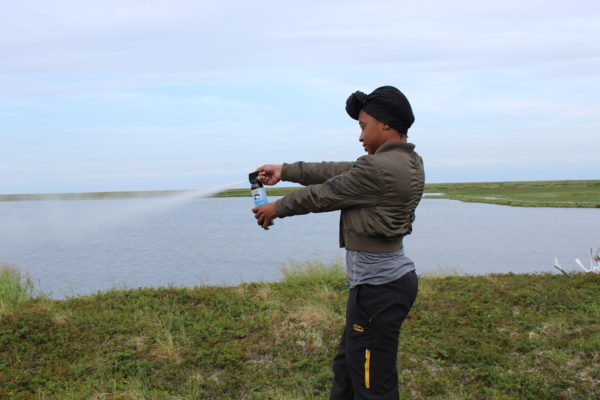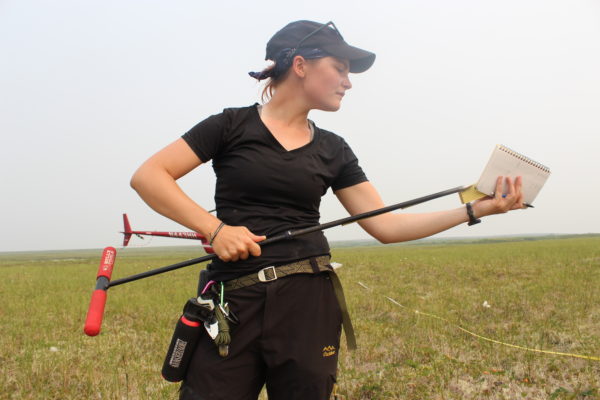I’m sitting on the Barge, drinking a cup of coffee, watching snow whip across the Panteleikha River. More than 24 hours of rain and snow have turned the dirt runway in Cherskiy to mud, threatening to delay our trip home (which is supposed to begin later today as we fly from Cherskiy to Yakutsk). A delayed flight out of Cherskiy would have many ripple effects (lots of rebooking of flights, hotels, buses, etc; lots of disappointment as our reunions with family and friends are postponed; and lots of additional expenses, potentially reaching $50,000…).
There are many easier things to do in life than to lead a group of 33 people to the Siberian Arctic, so why do I do this?
I’ve been asking myself that question this morning, intertwined with thoughts about missing my 6 year old son and 3 year old daughter, and facing the prospect of missing my wife’s 40th birthday on July 27.
Fortunately, there is an easy answer: This is the most important thing I can imagine doing. The Arctic is at the epicenter of global climate change, and how the Arctic responds to warming will have a huge influence on Earth’s climate system (and therefore human society) over the coming years and decades. The permafrost of the Arctic contains vast quantities of ancient organic matter, and nowhere is it more concentrated or more vulnerable than in the region I’m looking at now through the window of the Barge. Though our group of 33 is huge in some senses (such as when thinking about rebooking flights across 16 time zones…), it is tiny when compared to the magnitude of challenges facing scientists – and society – as we grapple with trying to understand the Arctic. So, I’ll keep hoping that our flight departs as scheduled this afternoon, but if not, I – and the larger group – will rally and use our extra time here to pry a few more secrets from this remarkable, challenging, critical, and beautiful environment.




Comments(4)-
-
-
-
Carol Spawn says
July 23, 2012 at 8:54 pmMax, Thanks for taking time to mentor these students and sharing your insight on global climate change with them. These young people are the future of science. No textbook or classroom would ever convey what they have experienced in the last four weeks. What an incredible opportunity for each and every one of them. I have enjoyed reading the journals and have been fascinated by the “out of the box” thinking & design of contraptions – simple, yet effective. Safe Travels! Carol Spawn
Max Holmes says
July 23, 2012 at 11:46 pmAnd the lessons continue…
One of the most important lessons that an aspiring scientist can learn, particularly one interested in working in the Arctic, is the importance of flexibility, patience, persistence, and moving forward from where you are (which is often not where you thought you’d be).
At 11 am this morning (local time) it was confirmed that the Cherskiy airport had closed for the day. We are now faced with lots of questions but few answers: When will we get to Yakutsk? When will we get to Moscow? When will we get home? How best to use our time between now and when we get home? How to pay for it all! In time the answers will come, in time we’ll all get home (it is still possible that we’ll make it home as scheduled, though this is not looking unlikely…), and in time this experience will add a chapter to the rich tale we’ll all have about the 2012 Polaris Project Expedition. For now we’ll accept the uncertainties and work to plot the best course forward from where we are. Plans are already being hatched that might include more fieldwork, or work on a group publication, or various seminars and discussions. In any case, we’ll take what the Arctic gives us, and in the end most of us will want to come back for more.
Kip Rithner says
July 24, 2012 at 10:24 pmHi Max,
I stopped by to encourage the Polaris team to enter photos in the PFS/CPS arctic-themed photo contest. (Details: http://www.polarfield.com/blog/arctic-photo-contest/.)
As often happens when I visit here, I got distracted by the adventure your team is having as I lingered among the 2012 posts. Your latest put a lump in my throat. Thank you, Max, for your commitment to helping the next generation understand the arctic system and its place in the world. And a very happy 40th birthday to your wife!
Kip Rithner
Marjorie Pitz says
July 25, 2012 at 12:40 amWe are eager to welcome you all home, but are glad you aren’t flying when conditions are horrible. Your leadership and attitude toward the ambiguous situation are reassuring and wonderful. Thanks for the update.